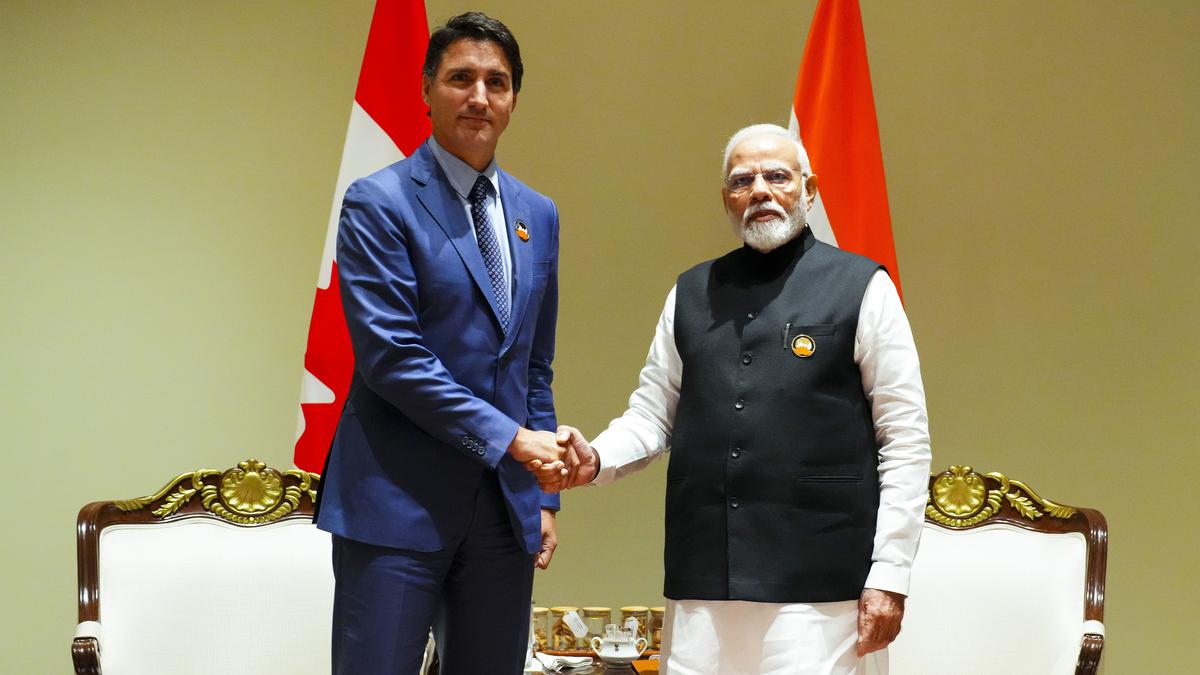
Why have India, Canada tensions worsened? | Explained Premium
The Hindu
What are the allegations levelled against India? Why does India accuse Canada of providing safe havens to pro-Khalistan extremists? How have other countries reacted? Why have visa services been suspended? What is the status of the Free Trade Agreement?
The story so far: Hours before parliamentarians in India were getting ready for a special session in the new Parliament building in Delhi on Tuesday, Canadian Prime Minister Justin Trudeau stood up in the Canadian Parliament in Ottawa to make a startling announcement. He alleged that agents of the Indian government were involved in the killing of a Canadian national, Hardeep Singh Nijjar, declared a terrorist as the head of the Khalistani Tiger Force (KTF) in India. Nijjar, 45, was shot dead by two masked gunmen as he left a gurdwara in Surrey in June this year. Despite the Canadian Prime Minister admitting that the investigation was still being pursued, his government had already decided to expel a senior diplomat from the Indian High Commission.
The allegations came a week after Mr. Trudeau was in India for the G-20 summit, and a stormy bilateral “pull-aside” meeting with Prime Minister Narendra Modi. After the meeting both sides issued readouts pointing fingers at each other for “foreign interference in Canada’s affairs” and “providing safe havens to anti-India extremists” respectively, but neither had revealed at the time that Nijjar’s killing had been discussed. In addition, it emerged that Canadian National Security Adviser (NSA) Jody Thomas had travelled to India twice in the past month, to discuss the case with India’s NSA Ajit Doval, although the government repeatedly said that no “specific evidence” had been provided by Canada. However, reports in the U.S media have suggested that Canada shared evidence with partners in the “Five Eyes” intelligence alliance comprising the U.S., the U.K., Canada, Australia and New Zealand prior to the G-20 summit, and that some of their leaders had discussed the issue with Mr. Modi.
Editorial | Serious allegations: On Canadian Prime Minister Justin Trudeau’s charges against India
After Mr. Trudeau spoke in Parliament, India responded in kind, and expelled a Canadian diplomat. The Canadian High Commissioner to India, Cameron McKay, was issued a demarche over the allegations, and told to downsize the mission strength of diplomats, some of whom, the Ministry of External (MEA) Affairs said, were interfering in India’s domestic matters. The MEA categorically denied Mr. Trudeau’s allegations, calling them “absurd”, but pointed out that not just Nijjar, many people wanted for Khalistani separatist violence in India received “safe haven” in Canada, despite a number of representations by India for their extradition. India has also suspended visa services across Canada, and will not accept applications from Canadians at any other mission worldwide, the MEA said, citing security concerns.
Mr. Trudeau is yet to release any specific evidence tying India to the killing, which if proven would constitute a violation of “Canadian sovereignty” and “international rule of law”. Canadian government sources were quoted by Canada’s public television CBC as saying that there was both SIGINT (Signal Intelligence) and HUMINT (Human Intelligence) inputs that included communications between diplomats within the Indian High Commission pointing to the Nijjar killing. If so, this would also mean that Canadian security agencies had surveillance operations targeting the Indian mission, a violation of diplomatic protocol.
Each of the Five Eyes countries, a grouping that came together in the post-Second World war era, have issued statements expressing concern over Canada’s allegations and called on India to cooperate with the investigation. The U.S. Secretary of State, Anthony Blinken, Australian Foreign Minister Penny Wong, British Foreign Secretary James Cleverly and New Zealand Foreign Minister Nanaia Mahuta have all made statements, yet none so far has gone further in backing the evidence Canada claims it has. Their reactions were also in sharp contrast to the “Skripal case” in the U.K., where the British government accused Russian agents of poisoning a former Russian operative and his daughter. Within days, each of the Five Eyes countries had expelled several Russian diplomats from their capitals, and the contrast in action now indicates a desire not to upset New Delhi as they deepen their strategic partnership with India.
However, U.S. NSA Jake Sullivan said the U.S. would not give India any “special exemption” if Mr. Trudeau’s allegations were proven. While Indian officials deny the allegation of an assassination, several former Indian diplomats have pointed to a “western double standard”, where the U.S.’s killing of designated terrorists in drone strikes or operations, including the killing of Iranian General Soleimani in Iraq or al-Qaeda chief Osama Bin Laden in Pakistan, is proudly proclaimed, but a similar operation allegedly carried out by India faces such scrutiny.





















 Run 3 Space | Play Space Running Game
Run 3 Space | Play Space Running Game Traffic Jam 3D | Online Racing Game
Traffic Jam 3D | Online Racing Game Duck Hunt | Play Old Classic Game
Duck Hunt | Play Old Classic Game











